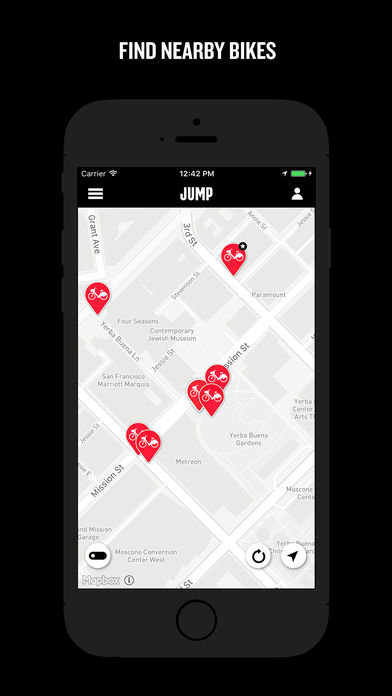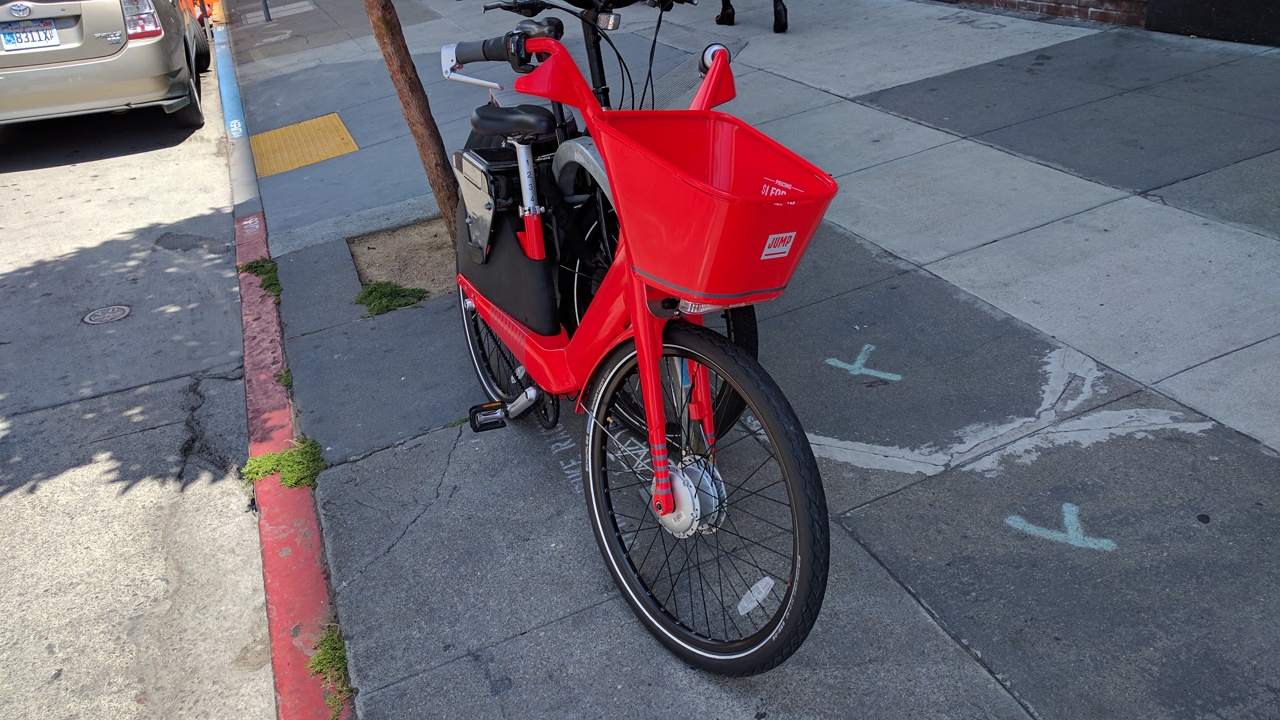This week, half a year after the city started offering a permit program for dockless bike share, the SFMTA issued its first permit for a non-Ford Go-bike share bike:
From the SFMTA release:
The permit has been offered to JUMP Bikes, a program of Social Bicycles, which offers an electric stationless bike share service. JUMP Bikes has demonstrated a commitment to San Francisco’s priorities of providing a safe, equitable and accountable bike share system and is the only company to have fulfilled the requirements of the SFMTA’s stationless bike share permit application.
Social Bicycles doesn't have an official launch date, although it will be "soon," said Ryan Rzepecki, the company's CEO. "Our warehouse in the Bayview is packed to the gills with bikes ready to be prepped and launched." Previously, Social Bicycles had 50 JUMP bikes operating in San Francisco, which were in circulation from July to October of 2017, as part of a UC Berkeley research project into transportation-mode choices. Those were pulled from circulation and are now waiting, along with 200 other bikes, for the official launch of the commercial service.

According to the story in the SF Examiner, the decision to grant the permit followed an arbitration agreement between Motivate, which operates the Ford GoBike system, and the city. Motivate was supposed to have an exclusive arrangement to operate bike share in San Francisco. However, with the introduction of JUMP-style bikes, which are GPS-based and require no docking stations, it became possible to offer bike shares without having to mount dedicated bike share stations on city property. The compromise with Motivate, apparently, is to allow e-bikes that won't compete in any substantial way with Ford GoBike.
"San Francisco’s topography effectively prohibits traditional pedal bike trips to many locations (e.g., Potrero Hill). E-bikes (i.e., electric-assist pedal bikes) would expand the destinations and locations where bike share bicycles could be picked up and dropped off, as well as appealing to additional customers who may prefer e-bikes over traditional pedal bikes," wrote SFMTA director Ed Reiskin in a memo to managers at the agency. "As a result, e-bike stationless bike share has the potential to serve additional neighborhoods and customers that are not served by the traditional pedal-based model offered by Ford GoBike."
"It extends the range considerably," added Rzepecki. "Average trip is about three miles, which is longer than traditional bike share, so you’re seeing a different type of trip, to more areas."
Advocates are also hoping that e-bikes, because they make it much easier for people to ride farther and up steep hills, will bring bike share to more low-income communities that often have few transportation options, such as the Bayview, where JUMP has their warehouse. "I think it's generally a good thing in a low density part of the city," said Clarissa Cabansagan, Senior Community Planner for TransForm. "For exposing lower-income parts of the city to biking, it [JUMP bikes] might be a viable option."
"It's really important that affordable, healthy transportation options are accessible to as many people as possible. That's why we led the charge to see $5 Bike Share for All memberships offered to low-income households, and it's why we're really excited to see e-bikes available to San Franciscans through bike share operators," wrote Chris Cassidy, spokesman for the San Francisco Bicycle Coalition.
Social Bicycles doesn't have a membership fee for JUMP bikes and will charge $2 for a 30-minute trip, and seven cents a minute after that. The bikes will work off of a smartphone app or a Clipper card (which has to be linked to the JUMP system online). According to Rzepecki, the bikes communicate via their onboard computers when the batteries are getting low. In the research pilot, company employees brought them back to the office to be charged. Moving forward, the company will install electrical charging stations, possibly on private property, to keep the batteries filled. "Users have incentives to bring it back to charge points," explained Rzepecki. "Maybe you get paid to for that trip." He said in other cities financial incentives have been used successfully to keep bikes distributed around the city and he expects to use similar incentives to keep them charged.
SFMTA will review JUMP's performance and allow them to increase the number of bikes up to 500 after nine months, contingent on additional permit fees. The SFMTA bike share operating permit costs between $12,000 and nearly $20,000, depending on how many bikes the operator intends to put on the streets. The SFMTA says it will not issue any other stationless bike share permits while the JUMP pilot is in effect; that means other operators, such as LimeBike and ofo, will be banned from San Francisco for at least the next 18 months. LimeBike, according to the SFMTA memo, applied for a permit in July.
Motivate, meanwhile, announced that it will add e-Bikes to its fleet starting in April.






